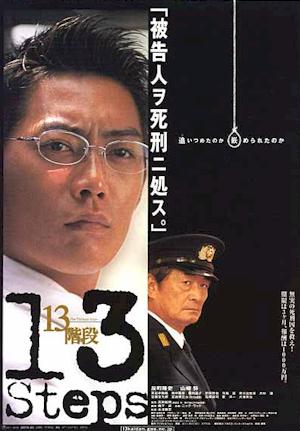|
|
|
|
|
|
|
|
The
Thirteen Steps |
|
|
| |
|
review | availability | |

Availability:
DVD (Japan)
Region 2 NTSC
Pony Canyon
2-Disc Set
16x9 Anamorphic Widescreen
Japanese Language Track
Dolby Digital 5.1 / DTS 5.1
Removable English Subtitles
Various extras

|
|
|
Japanese: |
13
kaidan |
|
|
Year: |
2003 |
|
|
Director: |
Masahiko
Nagasawa |
|
|
Writer: |
Tadashi
Morishita, Kazuaki Tadano (novel) |
|
|
Cast: |
Takashi
Sorimachi, Tsutomu Yamazaki, Kankuro Kudo, Shofukutei
Tsurubei, Rena Tanaka, Tetsuya Bessho, Susumu Terajimi |
|
|
The
Skinny: |
Interesting
crime drama that occasionally packs a punch, but the
ease with which the conflicts are resolved could tax
even the most forgiving. Lots of exposition and too
little actual emotion make this only a partly successful
thriller. Played at the 2003 Sundance Film Festival. |
|
|
Review
by Kozo: |
Takashi
Sorimachi (Fulltime Killer, GTO) is Junichi
Mikami, a convicted killer who's morose and utterly
quiet. Released after three years of model behavior,
it's clear that he's a man carrying the weight of his
deeds. Though his case was ruled as accidental manslaughter,
it would seem that he seeks more than just his three
years' penance.
At least, that's the opinion
of Shoji Nango (Tsutomu Yamazaki), a retiring prison
guard who's been witness to Mikami's entire prison term.
Nango feels that the two share a bond: both are trying
to atone for killing another human being, inadverdantly
or not. Nango was once the chief guard at a prison execution,
and had the misfortune of being the guy to push the
button on the unlucky inmate. That act has scarred Nango
deeply, leaving his personal relationships with his
wife and daughter in disarray. In hopes of healing whatever
void exists within him, he takes on a curious job: to
absolve Kihara (Kankuro Kudo), a death row inmate, of
his crime, thus saving him from possible death. He invites
Mikami to join him, hoping that the two can find some
sort of atonement together.
The themes thrown at the
audience in The Thirteen Steps are so deeply
humanistic as to be annoying. More than a few speeches
are given on how nobody has the right to take another's
life, and how the only possible way of atoning for such
a crime is to live with it for the rest of your days.
That message is a good one, and deeply felt, and the
characters of Nango and Mikami bear it out quite well.
Forgiving oneself and others is crux of The Thirteen
Steps' buried emotions. There's lots of slow pans,
static shots and still exposition from one character
to another, each speaking from the depths of their heart
and soul. While boredom is threatened, some moments
(especially when delivered by Yamazaki, who gives a
grave, grizzled performance) are riveting.
Still, this is a thriller,
so the film has to keep pace. Mikami and Nango's investigation
seems straightforward at first, but coincidences and
strange occurrences begin to pop up. The murder the
two are investigating actually took place in the hometown
of Sugiura, the man Mikami accidentally murdered. Nango
and Mikami scour the countryside for "thirteen
steps," which is the only clue given by the doomed
Kihara, but that clue opens up doors for Mikami too.
And what's behind the doors isn't necessarily good.
Eventually, revelations
are discovered, religious allusions are made, and some
mega, mega coincidences show up to make the whole thing
seem incredibly manufactured. Then, the film gets tied
up in a knot so pretty that you could stick it on a
box and call it gift-wrapping. That closure probably
satisfied many a paying customer, but it actually does
the film a disservice. The high-toned subjects that
The Thirteen Steps explores are tinged with human
darkness, and should be treated with more than lofty
exposition and too-easy connections. Much of the plot
is tied into inexplicable, passionate human emotions,
but everything gets written off with philosophical thoughts
that are deep in meaning, but also so compact that they
could be used as material for a greeting card.
This doesn't mean that
the film is bad. Director Masahiko Nagasawa certainly
paces the film effectively, and gets a fine performance
out of Tsutomu Yamazaki. Takashi Sorimachi is decent
too, but his strengths as a performer are ill-fitting
to the character of Mikami. Sorimachi has shown great
screen presence before, but he can't seem to bring any
weight to Mikami's burdened conscience. Mikami carries
deep passions, but they're hard to find beneath Sorimachi's
often blank expressions.
Ultimately, that same critique
applies to the whole film. The Thirteen Steps
has an involving plotline, which is more than enough
to keep most people watching, but it ultimately doesn't
stick to your gut as it should. There are some bursts
of powerful emotion (one of Nango's memories is particularly
vivid), but they're few and far between. Everything
is too static and too contrived to be truly affecting,
and even the "bad guys" are too easily redeemed.
A story that flirts with such darkness needs more than
lip service, but ultimately that's how it feels: like
people talking and talking about things that should
be felt. There is emotion buried in The Thirteen
Steps, but it's hard to truly see it beneath the
film's sterile veneer. (Kozo 2003) |
|
|
|
|
|
|
|
|
|
|
|
|
|
|
|
| LoveHKFilm.com
Copyright ©2002-2017 Ross Chen
|
|
|